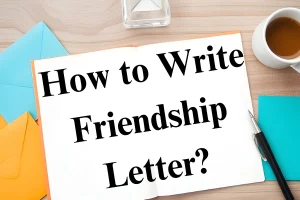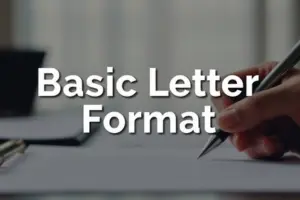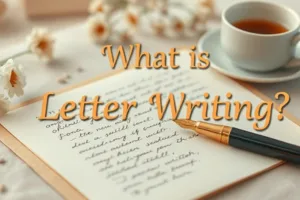What is a Thank You Letter? Purpose, Benefits, and Uses
Published: 26 Nov 2024
Have you ever wondered how a simple thank you letter can leave a lasting impression, both personally and professionally? Let me share a personal experience that shaped my understanding of its true value.
A few years ago, I was just starting my career, feeling nervous and unsure about how to stand out after a pivotal job interview. Instead of relying solely on a follow-up email like most candidates, I chose to write a thoughtful, personalized thank-you letter to the hiring manager. At first, I doubted myself—”Isn’t an email enough in today’s fast-paced world?” But I decided to take the extra step and express my gratitude in a way that felt genuine and unique.
The result? I received a call the very next day—not just to thank me for the letter, but to offer me the position! That’s when I realized that a thank-you letter is more than just polite words; it’s a powerful tool that bridges gaps, builds relationships, and showcases genuine appreciation.
Think of a thank-you letter as planting a seed of goodwill. Just like watering a plant helps it grow into something strong and beautiful, expressing gratitude through a thank-you letter nurtures relationships and allows them to flourish. A well-written letter can leave a lasting impression, one that grows stronger over time.
As Maya Angelou once said,
“I’ve learned that people will forget what you said, people will forget what you did, but people will never forget how you made them feel.”Maya Angelou
Now, let me ask you this: When was the last time you expressed your gratitude in writing? Was it to a mentor who guided you, a colleague who supported you, or a friend who made your day? Imagine how your words, carefully chosen and thoughtfully written, could make someone feel truly valued and appreciated.
In this article, we’ll explore the What is a thank you letter concept, importance, and types of thank-you letters, diving into what makes them so impactful. We’ll also weigh their pros and cons—highlighting why they’re a timeless way to foster connections while acknowledging situations where they might fall short. Whether you’re writing to thank a friend, a mentor, or a professional contact, understanding these nuances will help you craft letters that leave a lasting impression.
1. What is a thank-you letter?
A thank you letter is a powerful way to express gratitude and build stronger connections. Here’s what it does:
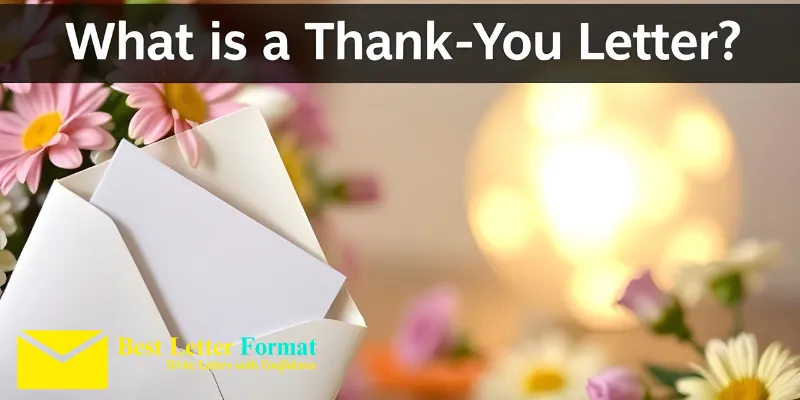
- Expresses Gratitude: Acknowledge someone’s kindness or effort.
- Strengthens Relationships: Show you value their time and actions.
- Leaves a Lasting Impression: A thoughtful message makes someone feel genuinely appreciated.
- Demonstrates Sincerity: Personalized letters showcase genuine effort and care.
2. Why Write a Thank You Letter?
A thank you letter shows thoughtfulness and strengthens relationships. Here’s why it matters:
- Expresses Gratitude: Acknowledge kindness, effort, or support.
- Strengthens Relationships: Builds trust and deepens personal or professional connections.
- Reflects Thoughtfulness: Demonstrates genuine appreciation for the recipient’s actions.
- Creates Positive Impressions: Leaves a lasting impact, showing that you value the other person.
- Builds Goodwill: Encourages stronger bonds and continued collaboration.
- Improves Communication: Opens doors for ongoing dialogue and future opportunities.
- Personalized Touch: A thank you letter stands out in a world of quick texts and emails.
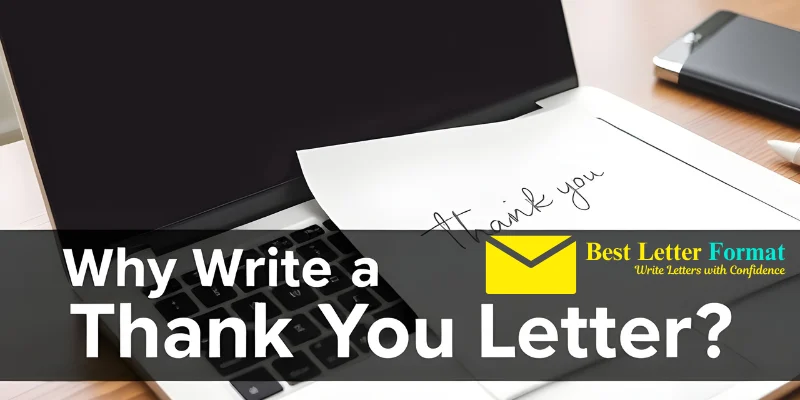
4. Uses of a Thank You Letter
A thank you letter is a versatile tool for expressing gratitude in various situations. It’s not limited to personal gestures; it plays a crucial role in professional and social settings too. Whether you’re nurturing relationships or leaving a positive impression, thank you letters can be adapted to countless scenarios to show appreciation.
Where to Use a Thank You Letter
- Post-Interview Follow-Up: Thank a recruiter for their time and consideration.
- Acknowledging Gifts: Show appreciation for thoughtful presents on birthdays, weddings, or other special occasions.
- Recognizing Mentorship: Thank a mentor, teacher, or guide for their valuable advice and encouragement.
- Client Appreciation: Express gratitude to loyal clients for their trust and business.
- Team Collaboration: Appreciate colleagues or team members who contributed to a successful project.
- After Networking Events: Thank someone for connecting with you or providing insightful advice.
- Celebrating Milestones: Acknowledge someone’s role in your achievements or special life events.
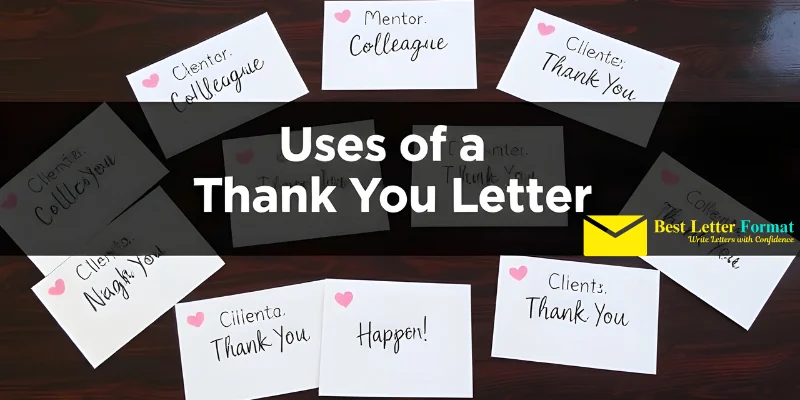
5. Types of Thank You Letters
A thank you letter can take many forms, depending on the relationship and the situation. From traditional handwritten notes to modern emails, these letters are tailored to the recipient and the context. Each type has its unique purpose, but they all share one goal: to express gratitude and build meaningful connections.
12 Types of Thank You Letters
- Personal Thank You Letter:
- Written for friends, family, or close acquaintances.
- Example: Thanking someone for hosting a dinner or giving a thoughtful gift.
- Professional Thank You Letter:
- Sent in a workplace or business context.
- Example: Thanking a colleague for teamwork or a client for their business.
- Handwritten Thank You Letter:
- A classic and personal format, often used for special occasions.
- Example: A thank you note for a wedding or a milestone celebration.
- Email Thank You Letter:
- Quick and convenient, ideal for professional or casual settings.
- Example: Following up after a job interview or thanking a colleague for their help.
- Post-Interview Thank You Letter:
- Sent to recruiters or interviewers to show appreciation for the opportunity.
- Example: Highlighting your gratitude while reiterating your enthusiasm for the role.
- Mentorship Thank You Letter:
- Written to acknowledge a mentor’s guidance and support.
- Example: Thanking a teacher, advisor, or career mentor.
- Thank You Letter for Gifts:
- Sent to express appreciation for thoughtful presents.
- Example: Thanking someone for a birthday, wedding, or housewarming gift.
- Business Thank You Letter:
- Used in professional relationships to strengthen partnerships.
- Example: Thanking a vendor or client for their loyalty and collaboration.
- Volunteer Thank You Letter:
- Sent to recognize and appreciate someone’s voluntary service.
- Example: Thanking a volunteer for their time and dedication to a cause.
- Thank You Letter for Recommendation:
- Written to acknowledge someone for providing a reference or recommendation.
- Example: Thanking a professor or employer for writing a glowing recommendation.
- Thank You Letter for Event Attendance:
- Sent to attendees to appreciate their participation.
- Example: Thanking guests for coming to a fundraiser, wedding, or corporate event.
- Thank You Letter for Support:
- Written to acknowledge emotional, financial, or moral support during a challenging time.
- Example: Thanking a friend or family member for being there when you needed them most.
Modern vs. Traditional Approaches
- Modern Formats: Emails and digital messages are quick, convenient, and eco-friendly. They work well in professional settings or when time is limited.
- Traditional Formats: Handwritten letters add a personal touch and show extra effort, making them ideal for close relationships or significant occasions.
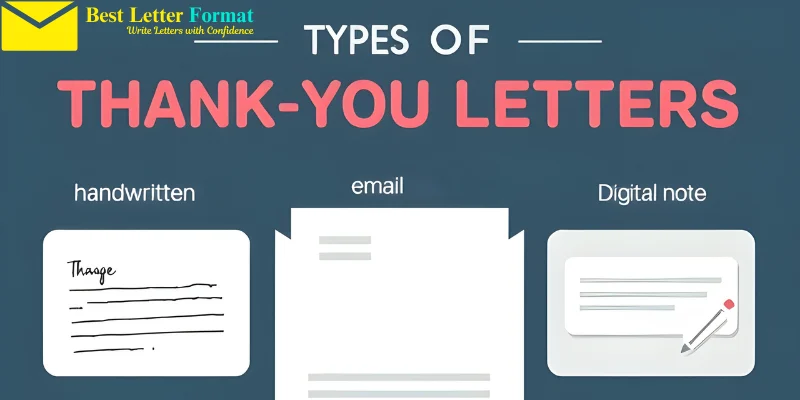
6. Advantages and Disadvantages of Writing a Thank You Letter
Writing a thank you letter can have a significant impact depending on the context, whether it’s in work, study, or entertainment. Let’s explore the advantages and disadvantages in these scenarios.
Advantages of Writing a Thank You Letter
- In Work:
- Strengthens Professional Relationships: Builds trust and goodwill with colleagues, clients, or superiors.
- Leaves a Lasting Impression: A thank you letter after an interview can set you apart from other candidates.
- Demonstrates Professionalism: Shows your respect and gratitude in workplace settings.
- In Study:
- Acknowledges Mentorship: Expressing gratitude to teachers or mentors fosters stronger academic bonds.
- Enhances Recommendation Opportunities: Professors are more likely to provide future references when they feel appreciated.
- Builds a Positive Reputation: Gratitude helps in forming meaningful connections within the academic community.
- In Entertainment:
- Strengthens Fan Connections: Artists or creators can build loyalty by thanking their supporters.
- Shows Appreciation for Collaborators: Acknowledging cast or crew members fosters teamwork and camaraderie.
- Encourages Future Collaborations: Gratitude can open doors for future creative opportunities.
Disadvantages of Writing a Thank You Letter
- In Work:
- Time-Consuming: Crafting personalized letters for every situation can take significant time.
- Tone Misinterpretation: In professional contexts, an overly casual tone might not be well-received.
- Might Seem Excessive: If overdone, frequent thank-you letters may lose their sincerity.
- In Study:
- Risk of Formality Missteps: Writing too formally or casually can affect the message’s impact.
- Pressure to Write Perfectly: Students might feel anxious about crafting the “right” message.
- Not Always Necessary: Some academic settings might view a thank you letter as redundant.
- In Entertainment:
- Overlooking Key Contributors: Forgetting to include someone in a thank you letter can lead to misunderstandings.
- Not Always Relevant: In fast-paced entertainment industries, letters might not hold as much value as direct acknowledgments.
- Risk of Being Seen as Insincere: If generic or rushed, the letter might fail to make a genuine impact.

FAQs on What is a Thank You Letter?
Thank you letters are meaningful gestures that show gratitude and build connections. Below are some common questions to help you better understand thank you letters.
What is a thank you letter?
A thank you letter is a message written to express gratitude for someone’s actions, support, or kindness. It can be formal or informal, depending on the relationship and context. Thank you letters help strengthen bonds and leave a positive impression.
Why should I write a thank you letter?
Writing a thank you letter shows appreciation and demonstrates thoughtfulness. It’s a small gesture that can make a big difference, both personally and professionally. A thank you letter also helps nurture relationships and builds goodwill.
What should I include in a thank you letter?
A good thank you letter includes a salutation, a clear expression of gratitude, specific details about what you’re thankful for, and a warm closing. Personalizing your letter makes it more meaningful. Keep it concise and sincere.
How soon should I send a thank you letter?
It’s best to send a thank you letter within a week of the event, interview, or gesture you’re appreciating. Timeliness shows that you value the other person’s effort. However, even if delayed, a thoughtful thank you is always appreciated.
Can I send a thank you letter digitally?
Yes, sending thank you letters via email is a quick and effective option, especially for professional contexts. Digital thank you letters are ideal when time is limited. However, handwritten notes can add a personal and heartfelt touch for special occasions.
Are thank you letters still relevant today?
Absolutely! In an age of quick messages and texts, a thank you letter—whether digital or handwritten—stands out. It shows effort, sincerity, and a willingness to take the time to express genuine gratitude.
What are some common situations where thank you letters are used?
Thank you letters are used after job interviews, receiving gifts, mentorship, successful collaborations, or event participation. They’re also great for acknowledging support or celebrating milestones. The key is to tailor the letter to the occasion.
How do I make a thank you letter stand out?
To make your thank you letter stand out, personalize it with specific details about what you’re grateful for. Use a warm tone, mention how their actions impacted you, and close with a positive and forward-looking note. A handwritten letter can add an extra layer of thoughtfulness.
Can I use a template for writing thank you letters?
Yes, templates can be a helpful starting point, but always personalize them to fit your relationship and context. Avoid generic language; instead, include specific details about the recipient and the occasion. A personalized touch makes all the difference.
What’s the difference between formal and informal thank you letters?
Formal thank you letters are typically used in professional settings, such as for job interviews, business collaborations, or client appreciation. They follow a structured tone and format. Informal thank-you letters are casual and are often used for friends, family, or personal gestures.
Conclusion
When I first wrote a thank you letter, I didn’t realize how impactful it would be. But now, I’ve experienced firsthand how such a simple gesture can:
- Build meaningful connections that last a lifetime.
- Express genuine gratitude in a thoughtful way.
- Leave a lasting impression on the recipient.
- Foster stronger relationships both personally and professionally.
Whether we’re thanking someone for a kind gesture, professional support, or simply being there for us, these letters allow us to express gratitude in a way that truly resonates. In today’s fast-paced world, taking the time to craft a thoughtful thank-you letter makes all the difference.
Let’s do this together:
- Take five minutes today to write a heartfelt thank you letter to someone who has made a difference in your life.
- Reflect on their impact and put your appreciation into words.
- Remember, your words can brighten their day—and maybe even yours.
Not sure where to begin? Check out our detailed guide on how to write a thank you letter for practical tips and inspiration to get started!
Do you have questions about writing a thank you letter? Or maybe you’ve written one before and have a story to share? Drop your questions or experiences in the comments section below! I’d love to hear from you and continue this conversation.

- Be Respectful
- Stay Relevant
- Stay Positive
- True Feedback
- Encourage Discussion
- Avoid Spamming
- No Fake News
- Don't Copy-Paste
- No Personal Attacks

- Be Respectful
- Stay Relevant
- Stay Positive
- True Feedback
- Encourage Discussion
- Avoid Spamming
- No Fake News
- Don't Copy-Paste
- No Personal Attacks
